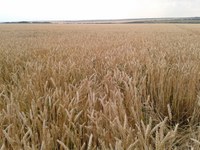Agricultural Network Provides Global Outlook
(Click the image below to view a high-resolution image that can be downloaded)
A nonprofit global network of agricultural economists believes profitable crop production in Russia, Ukraine and Argentina will boost output and exports.
The nonprofit group, agri benchmark, also finds that European producers are staying ahead of serious changes in their cropping systems, according to Andrew Swenson, North Dakota State University Extension Service farm and family resource management specialist. Swenson is a member of the network, which generates and disseminates analyses of major trends in global crop production.
More than 50 international agricultural economists met at agri benchmark’s annual Cash Crop conference this year to analyze results from 2016 crop production and provide an outlook for 2017 and beyond.
The evaluation of agricultural production elsewhere in the world is important to North Dakota, Swenson notes.
“Agriculture is global,” he says. “What’s happening in other countries affects us. North Dakota producers face strong international competition in the production of cash grains.”
One of the agricultural economists’ first key findings was that due to low input costs – nitrogen in particular – as well as low land costs and the devaluation of the national currencies in Russia and Ukraine, crop producers in those countries had a rather profitable year. In combination with yield increases, this has and will lead to significant increases in exports.
In 2015 and 2016, after a decade of growth in exports by more than 10 percent per year, Russia became the No. 1 wheat exporter.
The economists also found that Argentine crop production – particularly wheat and corn – benefited a lot from the abolishment of export taxes; profits of up to $50 U.S. per metric ton have been achieved. Therefore, in the near future, Argentina likely will become a major player in global wheat markets again. Both trends together are likely to contribute to ongoing pressure on global commodity markets, especially wheat.
Swenson says the second major topic of the conference was challenges for European producers because of tighter regulations on nutrient surpluses to protect water resources, a shrinking availability of effective crop protection products and tighter margins.
German agri benchmark partner Thomas de Witte presented results on adaptation strategies from two cases studies based on focus group discussions with regional advisers and growers. The key outcome was that moving away from winter crops and toward a more balanced mix with spring crops seems not only to be feasible but also economically viable. agri benchmark partners from the United Kingdom, Denmark and France confirmed that their growers face similar challenges.
The economists also discussed the economic analyses from sugar cane production in Mozambique, Zambia and Tanzania. They found that although this region has a sugar deficit and high sugar prices, production volumes still are relatively small. Dryland sugar cane production in these countries shows a cost disadvantage of roughly $100 U.S. per metric ton, compared with Brazil, the world market leader in sugar production.
However, irrigated areas, for example in Zambia, can produce sugar at very low cost and seem to be internationally competitive.
Even with higher costs, production in these countries is very profitable, mainly due to high domestic prices. That might motivate future investments, which should increase production volumes and limit opportunities for current sugar exporters if trade barriers remain in place, the economists said.
Visit http://www.agribenchmark.org for more information on agri benchmark.
NDSU Agriculture Communication - Sept. 5, 2017
| Source: | Andrew Swenson, 701-231-7379, andrew.swenson@ndsu.edu |
|---|---|
| Editor: | Ellen Crawford, 701-231-5391, ellen.crawford@ndsu.edu |


